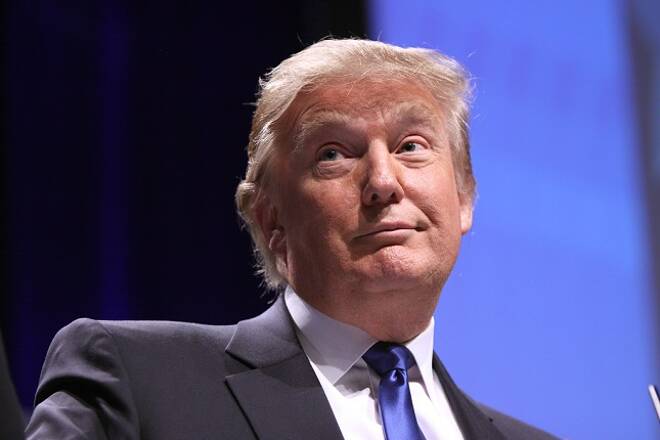Advertisement
Advertisement
Trump May Have Built Enough Goodwill to Press Forward with Tariffs Against China
By:
Today’s session begins with tensions high across the board after China said that it’s prepared to retaliate should the U.S. proceed with the additional tariffs on Friday. However, Trump may have built enough goodwill after the North Korean deal and given the strength in the economy, may be able to move forward with tariffs against China without severe political and economic consequences.
The major U.S. equity indexes are trading lower shortly before the cash market opening. Investors appear to be bracing for a “risk-off” session amid chatter that U.S. President Donald Trump will press ahead with additional tariffs on Chinese products.
According to a report from Reuters, President Trump is expected to announce today “pretty significant action” in tariffs on Chinese goods worth around $50 billion. CNBC is also citing three sources saying that fewer products would be affected, but the dollar value of those goods was unclear.
Some are saying that Trump is leveraging his denuclearization deal earlier in the week with North Korea against China, perhaps feeling he doesn’t need them to negotiate with the rogue nation.
Reuters said, citing an unnamed administration official, “Trump no longer thought of China’s influence over North Korea as a compelling reason not to impose tariffs now that the United States had a direct line of communication with Pyongyang.”
Others feel that Trump may have built enough goodwill after the North Korean deal and given the strength in the economy, may be able to move forward with tariffs against China without severe political and economic consequences.
The recent price action suggests that investors were comfortable enough to continue to buy stocks when the U.S. and China were negotiating on trade. However, today’s early weakness indicates that uncertainty has returned and this is making investors nervous.
Today’s session begins with tensions high across the board after China said that it’s prepared to retaliate should the U.S. proceed with the additional tariffs on Friday. Beijing could back off from an earlier promise to buy more American products including soybeans and natural gas, and announce tariffs against U.S. products that would hit Trump’s key base of political support.
The trend is up in the major U.S. stock indexes so today’s sell-off looks like a blip on the charts. Additionally, the markets have just completed a 10 day rally so profit-taking would not come as a surprise. It makes no sense to start exiting the stock market at the first sign of weakness because the trade issues between the U.S. and China could be cleared up fairly quickly.
Time will tell if this market will turn from bull to bear because the longer the uncertainty lingers, the more nervous investors will become. Furthermore, it may take an escalation of the trade conflict to really rev up the selling.
I’ll turn a little more bearish on this market if China retaliates with additional duties on U.S. exports and the U.S. counters with even more trade pressures. At this point, we can call it an escalation. Until then, I’d have to say that each side is still negotiating, but with a different level of strategies. I don’t think we’re going to see the markets sharply lower over the near-term, but a long, drawn out downtrend will send a signal that investors are starting to prepare for a lengthy trade war.
About the Author
James Hyerczykauthor
James Hyerczyk is a U.S. based seasoned technical analyst and educator with over 40 years of experience in market analysis and trading, specializing in chart patterns and price movement. He is the author of two books on technical analysis and has a background in both futures and stock markets.
Advertisement
